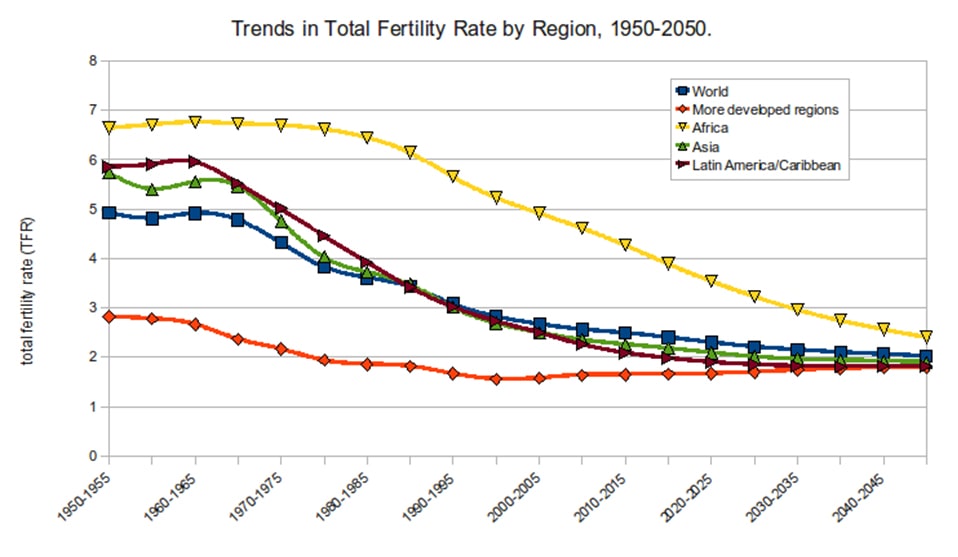Can Low Testosterone Affect Male Fertility?
In the United States and across the Western world, men are experiencing a fertility crisis, the likes of which have never been seen in medicine. Some experts estimate that total sperm counts have declined by a whopping 52% since the 1970s. To get an idea of how the scale of the decline in male fertility, have a look at this graph that documents fertility by region since 1950 and projects future fertility rates if current trends continue:

Fertility is a crucial aspect of health. Without enough quality sperm, conceiving children is impossible. Every year patients spend millions of dollars testing and attempting to treat fertility – sometimes with success and sometimes not. In many countries, including the United States, new births have fallen below what experts call the “replacement rate” – meaning that women are not having enough children to keep the current population numbers in the future. While, historically, research has focused on female fertility, the rapid and concerning decline in male fertility is a huge factor in the declining birth rates in developed countries around the world.
In some cases, infertility is caused by a medical condition that requires treatment. In other case, simple lifestyle adjustments can boost fertility. Most patients, however, require a comprehensive approach to treating fertility issues that includes treating any underlying health conditions, shifting the diet in favor of more healthy, whole foods, and, often, testosterone replacement therapy (TRT).
Some men experience large, unexpected drops in the important male sex hormone, testosterone, as they age. In this article, we will explore the relationship between testosterone levels and male fertility as well as how to address low testosterone naturally.
Symptoms and Causes of Infertility in Men
The first step for men who wish to correct fertility issues is to correctly identify symptoms, understand the causes, and get an accurate diagnosis from a qualified health professional.
Infertility Causes
 The causes of male infertility are often difficult to nail down in specific cases because the issue is often caused by a variety of factors working together to bring down sperm counts. A few common causes of infertility include:
The causes of male infertility are often difficult to nail down in specific cases because the issue is often caused by a variety of factors working together to bring down sperm counts. A few common causes of infertility include:
- Medical conditions (diabetes, undescended testicles)
- Malfunctioning endocrine (hormone) system
- Sexually transmitted disease (STD)
- Enlarged testicular veins (varicocele)
- Poor diet (low zinc, vitamin D)
- Lack of proper blood flow
- Obesity
- Anabolic steroid abuse
- Advanced age
- Prescription medications
- Environmental toxins (especially heavy metals)
- Radiation
Infertility Symptoms
 Some symptoms of infertility are more subtle than others. Many men who have low fertility have no noticeable symptoms. A few telltale signs of infertility include:
Some symptoms of infertility are more subtle than others. Many men who have low fertility have no noticeable symptoms. A few telltale signs of infertility include:
- Testicular pain
- Growth of breast tissue (gynecomastia)
- Limited facial hair
- Inability to achieve/maintain erection
- Frequent respiratory illness
Again, many affected men exhibit no outward signs of infertility. Only testing can provide a definitive diagnosis.
Infertility Diagnosis
Confirming a case of infertility is a multi-step process undertaken by a professional who is trained to look for specific markers and to rule out other possibilities. The diagnostic process involves the following steps:
- Medical history. Your provider will go over your medical records and discuss any previous or underlying health conditions that have previously been identified.
- Physical exam. The provider will check vital signs and examine the testes for any abnormalities.
- Lab tests. Lab tests to screen for infertility include urine analysis, semen analysis, and hormone tests to check for testosterone deficiencies.
Who is at Risk for Infertility
 Researchers have identified several risk factors for infertility in men. Many of these risk factors are common for a variety of illness:
Researchers have identified several risk factors for infertility in men. Many of these risk factors are common for a variety of illness:
- Smoking
- Obesity
- Nutritional deficits
- Age
- STDs
- Alcohol/drug abuse
Before any treatment for infertility, patients should address these risk factors to prevent fertility issues in the future.
Connection Between Testosterone Levels and Male Fertility
 Testosterone levels are directly correlated to sperm production and quality. Because testosterone has a direct impact on male fertility, low levels of this crucial male sex hormone are one usually one of the prime suspects for causing male infertility.
Testosterone levels are directly correlated to sperm production and quality. Because testosterone has a direct impact on male fertility, low levels of this crucial male sex hormone are one usually one of the prime suspects for causing male infertility.
Ways to Naturally Boost Male Fertility
Because of the risk factors for infertility discussed previously, getting plenty of sleep, abstaining from smoking and excessive drinking, and making sure you work plenty of fresh produce into your diet are proven ways to boost fertility naturally. Here are a few other ideas for boosting fertility:
- Vitamin D supplementation. Vitamin D, the “sunshine vitamin,” plays a crucial role in male reproductive health. Unfortunately, as much as 70% of the American population is deficient. Stock up on some affordable vitamin D from your local health food store or get the free kind with a walk in the sunshine.
- Exercise (especially weightlifting). The science is clear: activity levels are closely linked to fertility. Men who regularly engage in rigorous exercise, especially weightlifting, produce higher-quality sperm than men who do not.
- Control stress. Overworked Americans on tight schedules are known for their unhealthy stress levels. Stress is a proven contributor to low fertility. Meditation, yoga, and breathing exercises can go a long way towards helping you relax.
- Tribulus Terrestris. This traditional herbal remedy has won scientific recognition as an all-natural, effective fertility booster.
- Ashwagandha. In one study, men who were given moderate dosages of this ancient Indian root showed a 167% increase in sperm count over the control group.
Can Testosterone Replacement Improve Male Fertility?
When low testosterone is the primary culprit of infertility, TRT may help by increasing blood serum concentrations of the hormone. In other cases, TRT may affect fertility negatively. Although many men who undergo testosterone therapy remain fertile, if you are undergoing TRT then you should remain cognizant of the potential side effects.
On the other hand, testosterone replacement therapy (TRT) can sometimes decrease sperm production by way of decreasing follicle-stimulating hormone (FSH). Each person reacts differently to TRT. Your doctor can help assess your fertility before treatment and advise management options to boost fertility naturally, including the tips outlined in this article.

